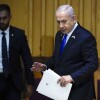As Congressman John Tierney seeks re-election, family may be his biggest liability. Last year, Tierney's wife spent a month in prison after she was convicted of helping her fugitive brother file false tax returns — and Tierney's family ties have loomed large in media coverage of his race against Republican Richard Tisei. Now Tierney seems to be sending the press a message: back off.
This week, Boston Globe ran a story about money that Congressman John Tierney’s wife received from her brother Robert Eremian. Tierney says that money was a gift — a claim he reiterated after he, Tisei, and Libertarian Daniel Fishman debated in Lynn on September 27.
"It’s crystal clear that Patrice received a gift from her relatives," Tierney said.
In fact, the Globe concluded the money Patrice Tierney received from Eremian — a federal fugitive who runs a gambling operation in Antigua — may have been payment for professional services instead. In that case, it would have been been taxable income.
Prior to the story's publication, Tierney hired noted libel lawyer Howard Cooper. The paper called Cooper's hiring a failed attempt to “dissuade the Globe from publishing." But Tierney has a different take.
"We just wanted to be able to make clear to the Globe that we thought they needed the facts before they wrote an article," Tierney told WGBH after this week's debate. "Howard's not just a libel attorney.... He's a noted lawyer in a lot of different areas."
The hiring of Cooper isn't the only notable example of friction between Tierney and the media. As the Globe pushed Tierney to make good on a pledge to release his tax returns, Tierney's campaign accused the paper of not acting in "good faith." And when Tierney was invited on Greater Boston, his campaign refused — claiming that WGBH's Emily Rooney had shown a “hostile attitude and bias” toward Tierney.
Meanwhile, according to multiple reports, Tierney threatened to skip his first debate with Republican Richard Tisei if the candidates were allowed to question each other. Tierney disputes those accounts. Asked after the September 27 debate what restrictions he'd insisted on for that event and subsequent events, he replied: "None."
CommonWealth magazine editor Bruce Mohl disputes that. Mohl moderated the September 27 debate and helped craft its structure. He told WGBH that Tierney’s campaign aggressively shaped the debate's structure.
"Mr. Tierney’s campaign manager objected to a section that had the candidates asking questions of each other," Mohl said. "We assured him it was about the American dream, and that we were going to stick to that subject. They said, 'No, we don’t like that format. we’re not going to participate if it’s in there.' So we did drop it."
Tierney's request that direct candidate questions be dropped was widely seen as an attempt to prevent Tisei from bringing up his wife's legal woes. Tierney later shifted gears, urging Mohl and other debate organizers to make "family" the first topic of discussion at the September 27 debate. They declined.
As the campaign's stretch drive approaches, Tierney seems to have decided that — when it comes to his wife's legal woes — he's going to discuss them on his terms, or not at all.




